Apple Inc.’s rumored augmented-reality glasses may not appear until 2025 or 2026, according to Jeff Pu, an analyst at Haitong International Tech Research.
The tech giant’s augmented- and virtual-reality moves are being closely monitored, with Apple
AAPL,
reportedly working on an AR/VR standalone headset and AR glasses for everyday wear.
In a note reported by PC Mag earlier this year, Pu said the glasses would be announced in late 2024. However, he now believes that they will debut later than that. “We now expect the AR Glass to be postponed to 2025-2026, due to design issues,” he said in an email to MarketWatch.
Apple has been teasing AR for a number of years, fueling talk about the company’s plans for glasses. Citing analyst Ming Chi-Kuo, MacRumors reported last year that Apple AR glasses could appear by 2025.
Now read: Apple CEO Tim Cook predicts AR will have ‘profound’ impact, downplays metaverse
In a recent interview with the Dutch media outlet Bright, Apple CEO Tim Cook described augmented reality as a “profound technology” that will affect everything. Apple is expected to announce its own AR/VR headset in the coming months, with the device likely available next year.
Apple has not yet responded to a request for comment from MarketWatch on its plans for AR glasses.
The global VR market was valued at $21.83 billion in 2021 and is expected to grow at a compound annual growth rate of 15% between 2022 and 2030, according to data from Grand View Research.
But Paolo Pescatore, technology analyst at PP Foresight, told MarketWatch that the market for VR and AR is still nascent. “It still feels like a solution looking for a problem,” he said via email. “While there seem to be numerous use cases, adoption and awareness remain lackluster.”
Opinion: Apple, more than Meta, holds the key to unlocking a ‘metaverse’-type world of AR
Nonetheless, there is scope for a wearable device that would connect to an iPhone, potentially opening up a ‘metaverse’-style world of AR. In this way Apple, more than Meta Platforms Inc.
META,
could hold the key to unlocking the potential of augmented reality.
A product geared toward smart glasses feels like a sensible approach and would also be consistent with Apple’s focus on wearable devices linked to its core product, the iPhone, Pescatore said. “Furthermore, this feels less intrusive and offers more scope for differentiation,” he added. “It builds upon its growing developer community and media partners who are now starting to release features for smart glasses.”
“The company has placed strong focus on the iPhone as a gateway to the Apple universe,” said Pescatore, noting that this might suggest it is behind the curve on new hardware. “All rivals have been seeking to differentiate with new product categories such as foldable devices, smart glasses, VR and more,” he said.
But just as Apple technologies such as the iPad and Apple Watch have revolutionized their respective product categories, Pescatore is confident that Apple can do the same with AR glasses. “Ultimately, when the device launches, Apple will kickstart consumer demand for smart glasses and the AR landscape in general,” he said. “For sure, a new device will provide much-needed excitement for the entire developer and creative communities.”
Apple’s stock fell 3.9% on Thursday, outpacing the S&P 500 Index’s
SPX,
decline of 0.7%.
